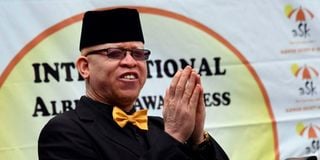Communicate state agenda

Former MP Isaac Mwaura. He has been appointed the Government Spokesperson.
In the modern world, effective communication is the linchpin that holds together societies, organisations and governments.
In the context of governance, it becomes even more crucial as it is through communication that citizens are informed about government initiatives, policies and developmental interventions.
However, despite having seasoned journalists at the helm of communication departments, the Kenya Kwanza administration has often fallen short in effectively communicating their intentions and actions, contributing to a growing disconnect between the government and its citizens.
Development communication is not merely a tool for transmitting information; it is the cornerstone of fostering trust, participation and transparency in governance.
It is the bridge linking the government’s intentions with the citizens’ understanding and expectations.
Sadly, this government has missed the mark on several occasions, leading to misunderstandings, scepticism and missed opportunities for collaboration.
One of the prime examples is the handling of the Big Four Agenda. This ambitious initiative—on affordable housing, universal health coverage, manufacturing and food security—has the potential to transform Kenya’s socioeconomic landscape.
But despite its noble goals, the public’s understanding of the Big Four remains vague and fragmented.
Breaking down complexities
The government’s communication departments should have taken the lead in breaking down the complexities of the agenda, articulating its benefits and engaging citizens in meaningful discussions.
But there is a noticeable lack of clear, consistent and inclusive communication, leaving many wondering about the impact of these initiatives on their lives.
The scepticism and distrust among Kenyans exacerbate the situation. The government’s failure to effectively communicate its intentions has played into this scepticism as many Kenyans question the transparency and accountability of public officials.
Trust is a fragile commodity; when it is eroded, it becomes increasingly challenging to regain.
Development communication is not a one-way street; it requires active engagement with the public.
The government’s communication departments should address citizens’ concerns, provide accurate information, and dispel myths and rumours to build trust in its ability to lead during a crisis.
Furthermore, its efforts to engage with the public through digital platforms have been inconsistent and often one-sided. While social media and digital channels can be powerful tools for reaching a wide audience, they require genuine interaction and responsiveness. Citizens should feel heard and valued but, all too often, their comments and queries go unanswered or are met with generic responses.
The communication departments should leverage these platforms to foster meaningful dialogues with the public.
They should actively address concerns, provide updates and solicit feedback to gauge the effectiveness of government policies and initiatives. Failure to do so not only alienates citizens but also perpetuates the perception that the government is out of touch with their needs and aspirations.
Effective development communication is not an option; it is a necessity for a government that aims to serve its citizens and foster trust.
The experienced journalists leading government communication have the opportunity to bridge the gap between its actions and public perception.
By prioritising transparency, engagement and accountability, they can build a stronger and more inclusive and responsive government that truly serves the needs and aspirations of Kenyans.
- Prof Miruka is the director, School of Business and Management Studies, The Technical University of Kenya (TUK). [email protected] or @ato_yiengo





